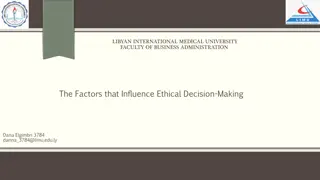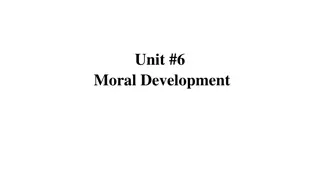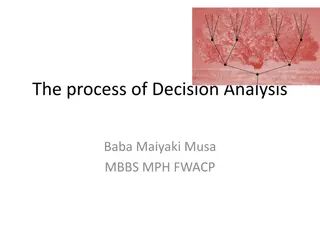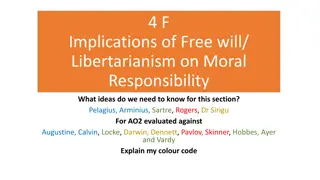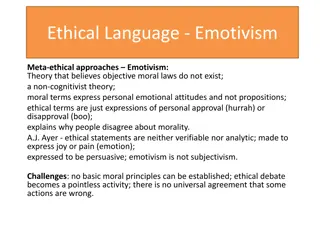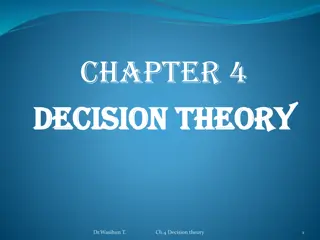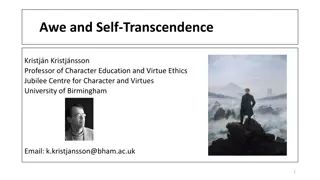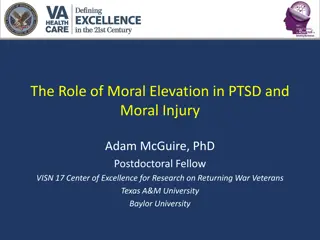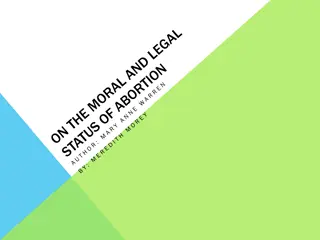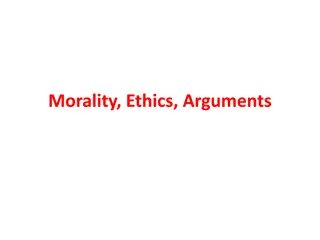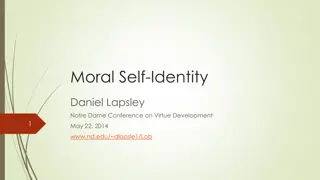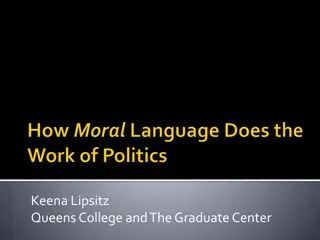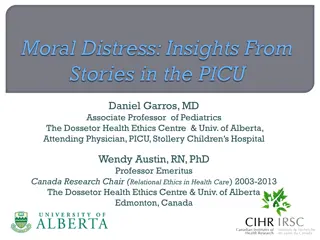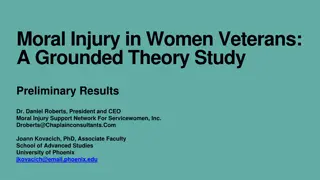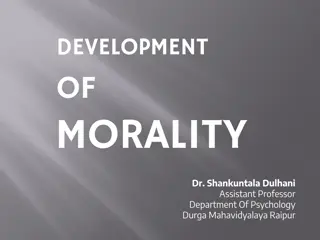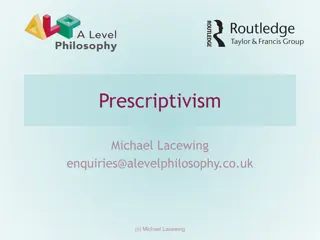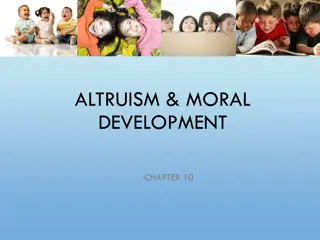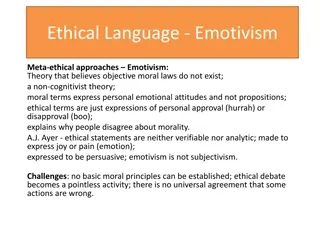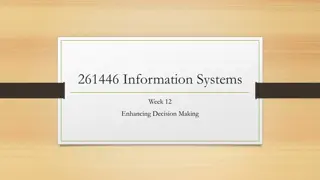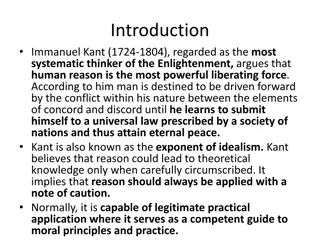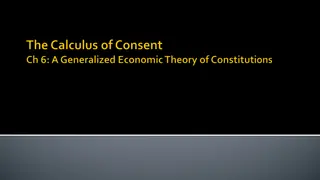Understanding Brain Development and Decision-Making Skills
Explore the fascinating realm of brain development and decision-making skills, focusing on how different brain regions activate during decision-making, the evolution of decision-making abilities from adolescence to adulthood, the importance of practicing decision-making skills, and the influence of
6 views • 10 slides
Factors Influencing Ethical Decision-Making in Business Administration
This presentation explores the various factors that influence ethical decision-making, focusing on significant individual factors such as personal moral philosophy, stage of moral development, motivation, gender, and experience. It emphasizes how individual, organizational, and opportunity factors c
9 views • 12 slides
Exploring Ethics: Branches, Theories, and Moral Dilemmas
Ethics delve into Meta Ethics, Normative Ethics, and Applied Ethics to understand moral concepts and decision-making. The discourse covers various ethical theories like Absolutism, Relativism, Subjectivism, and explores the difference between Teleological and Deontological decision-making. Thought-p
5 views • 14 slides
Making Informed Decisions in Environmental Science
Values play a crucial role in environmental decision-making. Scientific research is essential in addressing environmental issues, but understanding values is necessary before research can begin. This article discusses how values impact environmental decision-making and introduces an environmental de
0 views • 22 slides
Enhancing Career Decision Making Process
Explore the importance of good decision-making, types of decision makers, problems faced in decision making, readiness factors for career decisions, decision-making processes, and the CASVE cycle. Understand the significance of effective decision-making skills and how they impact our lives.
0 views • 26 slides
Understanding Kohlberg's Stages of Moral Development
Kohlberg's stages of moral development, built upon Piaget's psychological theory, outline six developmental stages of moral reasoning, with each stage offering a higher level of response to moral dilemmas. Kohlberg focused on justice in moral development and emphasized the importance of how individu
0 views • 19 slides
Understanding Moral Development and Moral Reasoning
Moral development involves an individual's sense of right and wrong, influenced by family, school, friends, and societal environment. Children learn moral concepts from interactions with parents, teachers, peers, and society, shaping their understanding of good and bad. Additionally, moral reasoning
0 views • 13 slides
Understanding Decision Analysis in Work-related Scenarios
Decision analysis plays a crucial role in work-related decision-making processes, helping in identifying decision makers, exploring potential actions, evaluating outcomes, and considering various values involved in the decision. This module delves into the steps involved in decision analysis, provid
0 views • 76 slides
Comprehensive Guide to Decision Making and Creative Thinking in Management
Explore the rational model of decision-making, ways individuals and groups make compromises, guidelines for effective decision-making and creative thinking, utilizing probability theory and decision trees, advantages of group decision-making, and strategies to overcome creativity barriers. Understan
0 views • 30 slides
Moral Responsibility and Free Will Implications in a Contemporary Context
This text delves into the implications of free will and libertarianism on moral responsibility, examining the ideas of various philosophers and thinkers such as Pelagius, Arminius, Sartre, and more. It explores the concepts of moral agency, determinism, normative ethics, religious beliefs, and the c
5 views • 12 slides
Understanding Emotivism in Ethical Philosophy
Emotivism is a meta-ethical theory that rejects objective moral laws, instead positing that moral terms express personal emotional attitudes, not universal truths. Influenced by A.J. Ayer and rejecting naturalism, this theory suggests that ethical statements are not objective propositions but rather
0 views • 28 slides
Ethical Decision Making in Clinical Practice: Understanding Dilemmas and Solutions
An examination of ethical decision making in nursing, focusing on defining ethical dilemmas, addressing moral distress, and exploring the purpose of nursing ethics. The importance of aligning personal and professional values, ethical principles, and laws in resolving ethical dilemmas is discussed, a
0 views • 8 slides
Introduction to Decision Theory in Business Environments
Decision theory plays a crucial role in business decision-making under conditions of uncertainty. This chapter explores the key characteristics of decision theory, including alternatives, states of nature, payoffs, degree of certainty, and decision criteria. It also introduces the concept of payoff
0 views • 41 slides
Understanding Utilitarianism and the Principle of Utility
Utilitarianism, as explained by Michael Lacewing, emphasizes that actions are morally right or wrong based on their consequences in maximizing overall happiness. The principle of utility, advocated by Bentham and Mill, guides moral judgments by promoting the greatest happiness for the greatest numbe
0 views • 9 slides
Challenges and Opportunities of Moral Revolution in Indonesia
The need for a moral revolution in Indonesia to address societal issues like corruption, conflict, and intolerance. Contrasting mental and moral revolutions, the focus is on behavior change to build a humane society with healthy moral values. Initiatives and discussions highlight the urgency of tran
0 views • 13 slides
Exploring Awe and Self-Transcendence in Moral Character and Selfhood
Delve into the relationship between emotions, personality, and the self, with a focus on awe as a key emotion shaping moral character and selfhood. Discover its conceptual nuances, moral significance, and impact on ethical decision-making, generosity, and prosocial behaviors. Uncover the interconnec
0 views • 25 slides
Understanding Moral Elevation in PTSD and Moral Injury
The research by Dr. Adam McGuire explores the role of moral elevation in PTSD and moral injury, emphasizing how witnessing virtuous behaviors triggers emotional and physical responses leading to a desire for imitating virtuous acts. By integrating prosocial emotions into trauma treatment, the positi
0 views • 13 slides
Understanding Humanity and Moral Community in the Context of Abortion Ethics
Exploring the complex ethical considerations surrounding abortion, this discussion delves into determining the humanity of a being, defining the moral community based on traits of personhood, fetal development, and the right to life. The arguments include the morality of abortion, the definition of
0 views • 9 slides
Understanding Morality, Ethics, and Arguments in Philosophy
Morality and ethics are interconnected concepts that delve into the principles of right and wrong conduct. They involve disciplined reflection on human moral intuitions and choices. Valid and invalid moral arguments exemplify the importance of drawing evaluative conclusions from facts. Various ethic
0 views • 9 slides
Challenges to Moral Anti-Realism: Objections and Responses
The article explores objections to moral anti-realism, including moral nihilism, condemning immorality, and the notion of moral progress in the absence of moral reality. It addresses concerns about the justification for interfering with others' behavior, the relationship between moral beliefs and ob
0 views • 6 slides
Understanding Moral Self-Identity Development
Situating moral self-identity within ethical theory and developmental psychology, this overview explores the centrality of morality within the self-concept. It discusses the chronic accessibility of moral schemas, the importance of strong evaluation in moral behavior, and the connection between mora
0 views • 33 slides
Understanding Moral and Constitutional Values in Relation to Judiciary
Explore the concepts of moral values and constitutional values, emphasizing their importance in decision-making processes and societal norms. Discover the stages of moral development and delve into constitutional values such as sovereignty, socialism, secularism, democracy, justice, liberty, equalit
0 views • 9 slides
Analysis of Moral Language in Political Communication
Explore how Republican and Democratic elites use distinctive moral language and its impact on voters in the context of the 2012 election data. Discover the application of Moral Foundations Theory in understanding political differences in the United States and how moral intuitions influence public op
0 views • 13 slides
The Influence of Disgust on Moral Behavior in Psychological Research
Explore the impact of disgust on moral behavior through various studies, including moral dilemmas and criteria for moral judgment. Research delves into how disgust affects decision-making processes related to moral dilemmas and helping behavior. Discover the connection between physical disgust and i
0 views • 16 slides
Understanding Moral Distress in Healthcare
This content discusses the concept of moral distress in healthcare, defined as the pain and anguish experienced when one knows the right thing to do but faces internal or external barriers preventing action. It explores the implications of moral distress on healthcare practitioners and emphasizes th
0 views • 25 slides
Insights on Moral Injury Among Women Veterans: Preliminary Study Findings
Preliminary results from a grounded theory study on moral injury in U.S. women veterans reveal themes such as sexual assault, hostile work environments, and more. Participants shared their experiences, highlighting the nature of moral injury they faced, distinguishing between various forms of discri
0 views • 21 slides
Understanding Moral Development: Insights and Perspectives
Morality is the belief in right behavior accepted by society. It involves moral behavior, feelings, and judgments. Moral development evolves from childhood to adulthood, influenced by experiences and challenges. Freud's id, ego, and superego theory and Skinner's behaviorism contribute to our underst
0 views • 12 slides
Exploring Moral Judgments and Prescriptive Meaning in Ethics
This content delves into non-cognitivism, Hare’s prescriptivism, and moral anti-realism to understand what we do when making moral judgments. It discusses prescriptive meaning, the concept of good, and how moral language guides actions. The objections raised regarding moral language's functions, p
0 views • 9 slides
Should Assisted Suicide be Legalized in China? Decision-making with Six Thinking Hats
The content discusses the decision-making process using the Six Thinking Hats method to determine whether assisted suicide should be legalized in China. Various tools and sessions are highlighted, guiding participants through considering different viewpoints, analyzing arguments, and making an infor
0 views • 12 slides
Understanding Altruism and Moral Development Theories
Explore the components of morality, theories of moral development by prominent psychologists like Piaget and Kohlberg, and the stages of moral development in individuals. Learn about moral affect, reasoning, and behavior as integral aspects shaping one's ethical framework and decision-making process
0 views • 40 slides
The Assisted Decision-Making (Capacity) Act 2015 in the Criminal Justice Context
The Assisted Decision-Making (Capacity) Act 2015 introduces key reforms such as the abolition of wards of court system for adults, a statutory functional test of capacity, new guiding principles, a three-tier framework for support, and tools for advance planning. It emphasizes functional assessment
0 views • 17 slides
Implementing Group Decision-Making Tools with Voting Procedures at Toulouse E-Democracy Summer School
Decision-making in organizations is crucial, and group decision-making can lead to conflicts due to differing views. Group Decision Support Systems (GDSS) are essential for facilitating decision-making processes. The Toulouse E-Democracy Summer School discusses the implementation of voting tools in
0 views • 21 slides
Friedrich Nietzsche's Genealogy of Morals: Uncovering the Evolution of Moral Values
Friedrich Nietzsche critiques traditional philosophy for overlooking the historical development of moral concepts. He argues that moral judgments were initially based on strength and power, later evolving into the dichotomy of master and slave morality. By tracing the genealogy of moral terms, Nietz
0 views • 10 slides
Decision Analysis: Problem Formulation, Decision Making, and Risk Analysis
Decision analysis involves problem formulation, decision making with and without probabilities, risk analysis, and sensitivity analysis. It includes defining decision alternatives, states of nature, and payoffs, creating payoff tables, decision trees, and using different decision-making criteria. Wi
0 views • 27 slides
Understanding Emotivism: A Non-Cognitivist Theory in Ethics
Emotivism is a meta-ethical theory that posits the absence of objective moral laws, suggesting moral terms express personal emotional attitudes rather than propositions. Influenced by philosophers like A.J. Ayer and Hume, it challenges the existence of basic moral principles and universal agreement
0 views • 23 slides
Enhancing Decision Making with Information Systems
Explore the role of information systems in enhancing decision-making processes within organizations. Topics include business intelligence, types of decisions, decision-making processes, and managerial roles. Learn about structured, unstructured, and semi-structured decisions, different models of man
0 views • 21 slides
Kant's Moral Philosophy: Reason, Freedom, and the State
Immanuel Kant, a prominent Enlightenment thinker, emphasizes the liberating power of human reason in guiding individuals towards moral principles and practices. Kant's moral philosophy centers on treating each person as an end-in-itself, driven by the good will informed by reason. His concept of mor
0 views • 14 slides
Decision Making and Constitutional Rules Behind the Veil of Ignorance
In decision-making for collective actions, individuals behind a veil of ignorance need constitutional rules to govern future decisions. The choice of rules, the expected external costs, and decision-making costs play a crucial role in determining the optimal decision-making rule. By minimizing total
0 views • 16 slides
Forms of Moral Reasoning and Ethics in Decision-Making
Explore the main forms of moral reasoning in ethical decision-making, including virtue ethics, deontological reasoning, and teleological reasoning. Understand the importance of developing ethical virtues and principles in guiding behavior. Delve into examples of reasoning from virtue and deontologic
0 views • 28 slides
Understanding Natural Law Theory and Moral Principles
Natural Law theory is based on the idea that the good aligns with fundamental design, prescribing moral behavior. Rooted in Aristotle's teleological view, it encompasses concepts like Aquinas' hierarchy of laws and natural inclinations. Qualifying principles such as the Doctrine of Double-Effect gui
0 views • 17 slides

